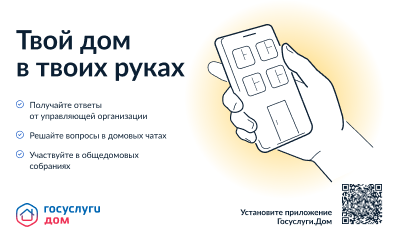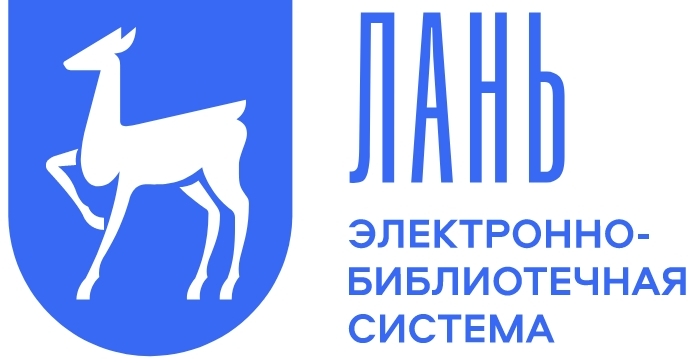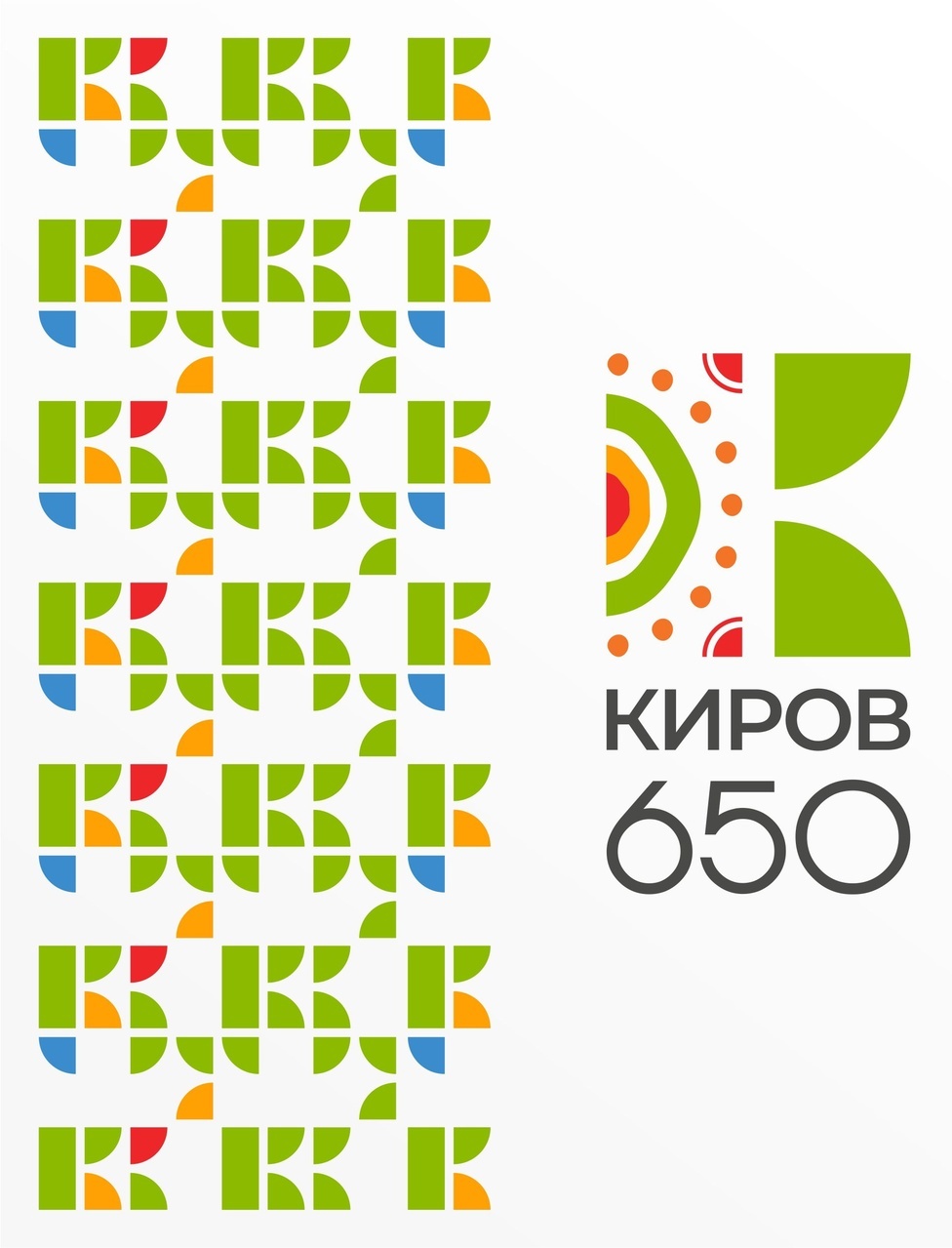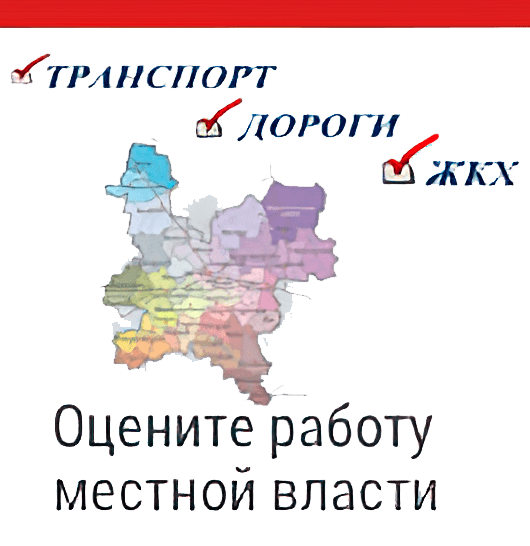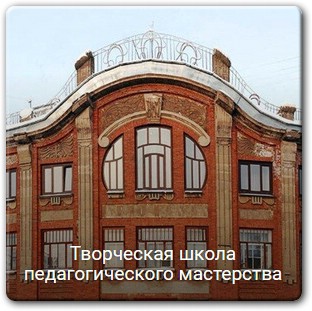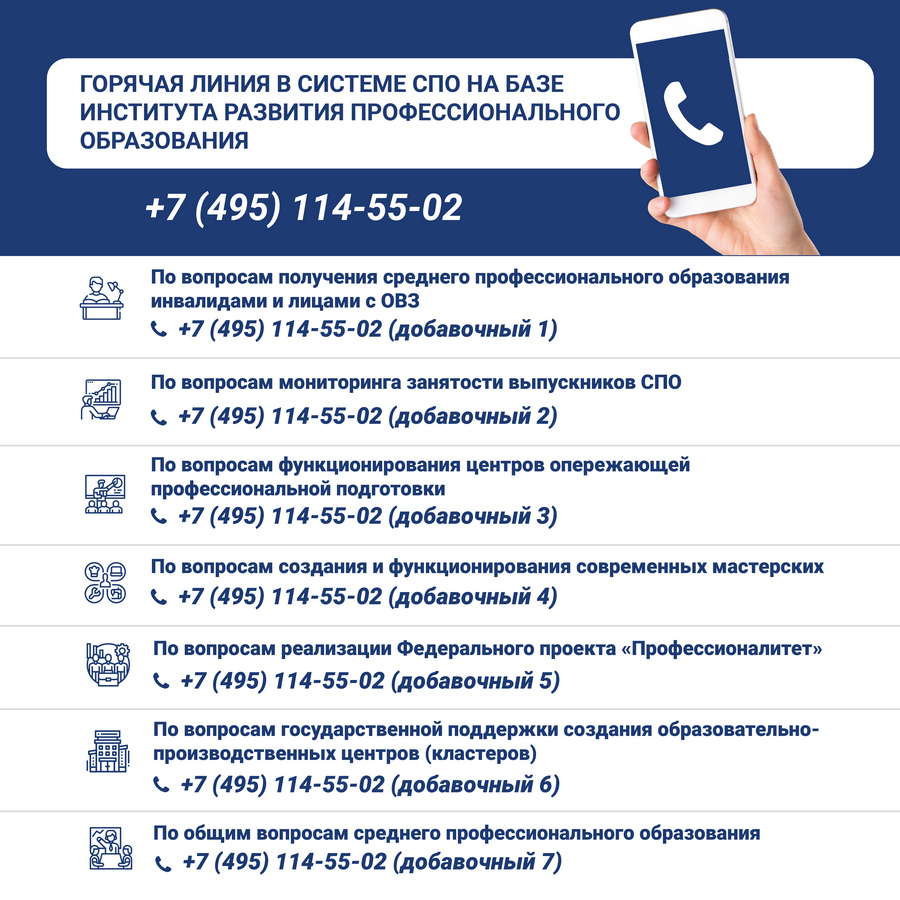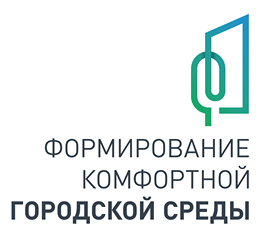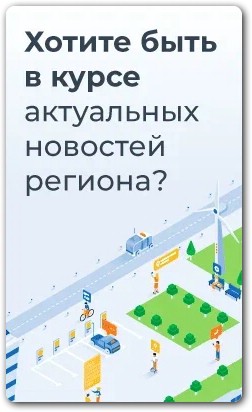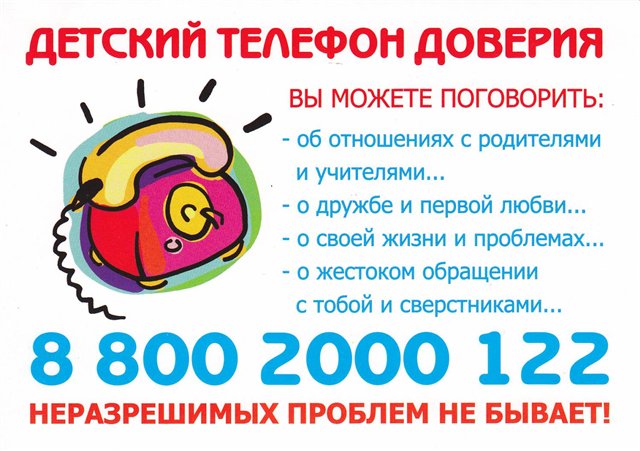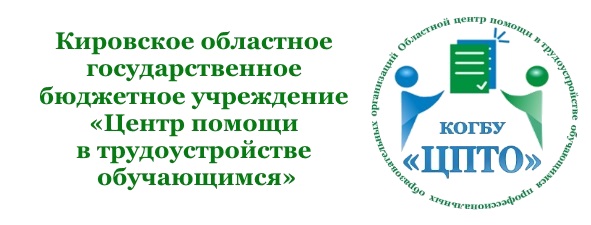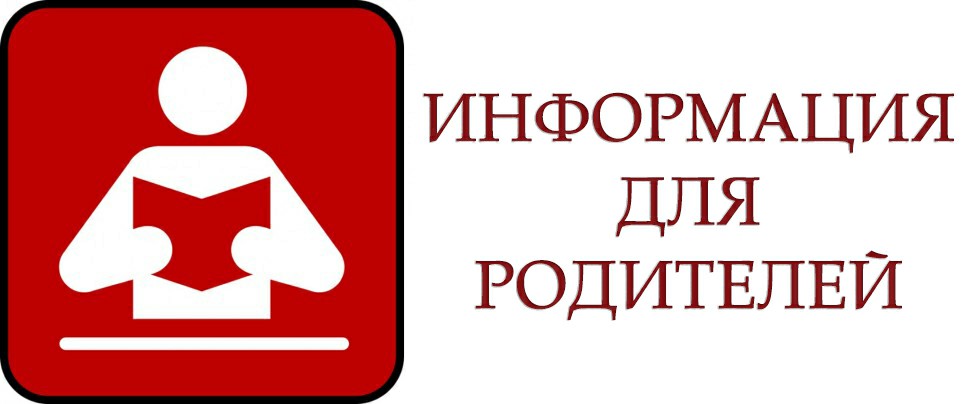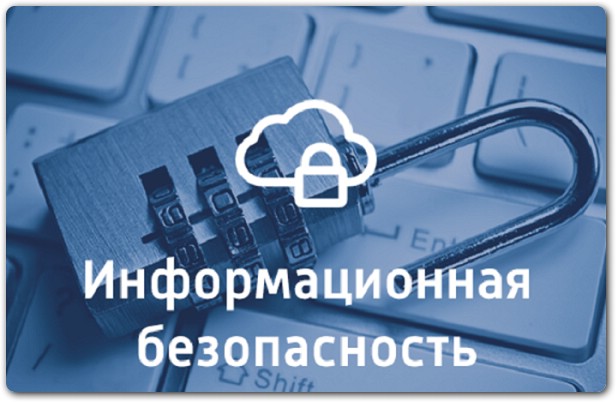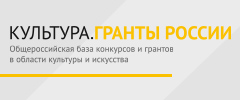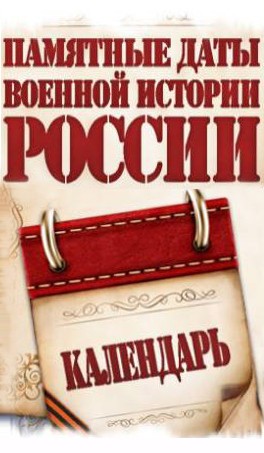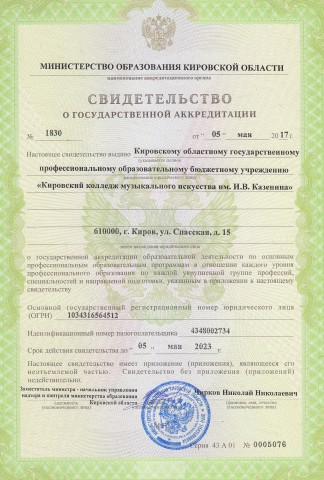1.1. State educational institution of secondary vocational education Kirov Regional College of Musical Arts. I V Kazenin (here «College») is a public educational institution, implementing programs of secondary vocational education of high level in accordance withstate educational standards, on the basis of basic general, secondary (full) general, primary vocational education.
1.2. State educational institution of secondary vocational education Kirov Regional College of Musical Arts. IV Kazenin is the successor of the Kirov Regional College of Art.
1.3. College is guided by the Constitution of the Russian Federation, the Law «On education», the Law of the Kirov region on Education in the Kirov region, standard regulations on educational institutions of secondary vocational education (secondary specialized educational institution), the normative legal acts of the Russian Federation and Kirov Oblast , the present Charter and local acts regulating its activity.
1.4. The founder of the college is the executive body of the Kirov region: Department of Culture and Art of the Kirov region (the «Founder»).
The full name of the college — State educational institution of secondary vocational education Kirov Regional College of Musical Arts. I V Kazenin.
Short – GOU SPO KOKMI of I V Kazenin.
1.5. The legal and actual address: 610000, Kirov (region),Drelevski,St.15.
1.6. College is a legal entity and has a seal bearing the State Emblem of the Russian Federation and its name, its own balance, has the right of operative management of a segregated part of state property, has bank accounts opened in accordance with existing regulations, carries out its activities in accordance with legislation of the Russian Federation. College is entitled to his own name to enter into contracts, acquire property, personal property rights, bear duties, be a plaintiff or defendant in court.
1.7. The relationship between the college and the founder are determined in accordance with the RF legislation. Relations with the college students, their parents (legal representatives) are regulated in the manner prescribed by this Charter.
1.8. The rights of College, part of the statutory administrative, financial, economic and other activities arise from the moment of its registration.
1.9. College reserves the right to educational activities, and the existing license, and certificate of state accreditation of the Kirov Regional College of Art to be re-issuance in connection with the renaming of the educational institution.
The right to give diplomas to graduates of the establishment of the sample to the inclusion in the scheme of Central government funding arise from the state accreditation as certified by the appropriate certificate. College is accredited in the manner prescribed by applicable law.
1.10. Medical students at the College provided medical aid station.
1.11. Food is provided in the canteen of the college.
1.12. In college, the formation and organizational structures of political parties, socio-political movements and religious organizations are forbidden.
1.13. College is preparing specialists for the following specialties:
070102 Instrumental performance;
070104 Vocal Arts;
070,106 Choral Conducting;
070109 Musical variety art;
070113 Theory of Music.
College can prepare citizens for other professions after making changes and additions to this Charter and its application to the license.
1.14. It is envisaged the development of educational programs is fulfilled in accordance with state educational standards in the form: full-time, part-time (evening).
1.15. College is self-sufficient in the implementation of the educational process, selection and placement, creative, scientific and methodological, financial, economic and other activities except in cases requiring the consent of the Owner.
The activities of the College is based on the following principles:
— humanistic nature of education, the priority of human values, free personal development, civic education
— and respect for spiritual values, national and world culture;
— unity of the federal cultural and educational space;
— autonomy of the College;
— democratic nature of the management of its activities.
2. KEY TASKS OF THE COLLEGE AND THEIR REALIZATION.
2.1.The tasks of the college:
— Meeting the needs of a person in getting of secondary vocational education (high level), the intellectual, cultural, physical and moral development;
— Creation of favorable conditions to meet students needs in self-education, upper secondary professional and secondary education;
— Meeting the needs of society for qualified specialists with secondary professional education;
— Organizing and conducting teaching, research and teaching, as well as creative works and researches in the field of multi-level training in the presence of the logistical and staffing;
— Retraining and skills development;
— Spread of knowledge among the population, increase its educational and cultural level, by giving the provision of additional paid educational services.
2.2. To implement the main tasks college has the right to:
— Independently according to state educational standards to develop, adopt and implement educational programs;
— Develop and approve the curriculum, the annual school calendar schedule and timetable;
— Choose the forms, means, methods, training and education within the limits defined by the legislation on education;
— To choose their own system of evaluation forms, order and frequency of interim certification of students;
— To realize additional educational programs and to give additional educational services beyond the basic educational programs, defining the status of the institution; wage for receiving paid educational services is established by director of the college in accordance with the approved estimates;
— Include to carry out its statutory activities for additional sources of financial and material resources;
— Act as a tenant of property;
— Implement regarding property rights assigned to the college property in accordance with current legislation;
— Form committees, associations, unions and other associations, with the participation of institutions and public organizations;
— To provide mediation services, to acquire shares, bonds, other securities and receive income on them, to conduct business activities that are not prohibited by the legislation of Russia and not suffered by the main statutory activities.
3. STRUCTURE OF THE COLLEGE
3.1. The College has in its composition: the object-cyclic Commission, Children’s music school, teaching and creative teams, training and support departments, administrative and management units, production and economic services. College is a single training-productive, creative complex — an educational institution.
3.2. All units are involved in training and in the educational process.
3.3. Different forms of organization and pay may be used in the business units, as well as a flexible work schedule in accordance with the requirements of labor legislation.
3.4. Subject-cyclic Commission (hereinafter SCP) are the main entities of the college engaged in educational, creative, concert performances, methodical work.
Management SCP is regulated, Chairman by of the SCP, appointed by director of the college from the most authoritative, experienced teachers for the term of one year.
SCP activities are regulated by the Statute of the SCP.
3.5. The College has the following SCP:
— Special piano;
— Orchestral string instruments;
— Orchestral wind and percussion instruments, instruments of variety orchestra;
— Folk Instruments Orchestra;
— Academic singing;
— Variety singing;
— Choral Conducting;
— Folk song;
— Orchestral conducting;
— Accompanist and chamber music training;
— General and piano accompanists;
— Theory of Music;
— The history of music;
— General education and humanities;
— Practical training.
3.6. Children’s Music School (Music School) is dependent structural unit of the College, undertaking early training at the primary level of musical education of children who have shown musical talent. Funding for school is made at the expense of budgetary funds and tuition fees.
EDUCATIONAL CREATIVE PROCESS:
3.7. Educational and creative team is one of the major units, training of specialists is conducted in accordance with educational standards.
Leaders of teaching creative teams are appointed by director in consultation with the SCP.
3.8. The school has the following educational and creative teams:
— Symphony Orchestra;
— Brass Band;
— Jazz Band;
— Variety ensembles;
— Orchestra of Russian Folk Instruments of senior courses;
— Orchestra of Russian folk instruments junior courses;
— Academic Choir;
— Folklore ensemble.
TRAINING AND SUPPORT DEPARTMENTS:
3.9. Training and support departments provide the necessary materials for educational institution, assisting students in their independent work. Department heads are appointed by the director.
3.10. The College has the following educational support departments:
— The library;
— A concert hall;
— The study of recording and music library;
— The lingostudy;
— A study of socio-economic disciplines;
— A study of musical literature;
— A study of folk art;
— Gym;
— A study of aesthetics;
— A study of teacher training.
ADMINISTRATIVE MANAGEMENT BRANCH:
3.11. Administrative management unit is the mechanism of the College, providing training and organizing the creative and educational processes, conducting economic and financial activities, office work.
3.12. The College has the following administrative and management units:
— Management;
— Training units;
— Office and Personnel Department;
— Archive;
— Accounting unit;
— Housekeeping unit;
— Sector of manufacturing practices.
3.13. The work of the directorate is conducted by the director. Leaders of other subdivisions are appointed by the director. Deputy Director and chief accountant are appointed by director in consultation with the founder.
INDUSTRIAL AND HOUSEHOLD SERVICE:
3.14. Production and economic services provide maintenance and operation of college buildings and a hostel, catering and medical services, maintenance of equipment and tools, perform the procurement functions.
Management of production and economic services are conducted by Deputy Director for administrative work, appointed by director in consultation with the founder.
3.15. The College has the following production and economic life:
— Utility Services of College:
— Utility Services of hostel:
— Repairing and tuning musical instruments;
— Canteens;
— Health center.
3.16. In the conduct of college there is a hostel which is located at: Kirov Popov St, 30.
4. THE ADMISSION TO THE COLLEGE:
4.1. The right to free education at the College is enjoyed by those who receive professional education for the first time. The Admission to the College is on a competitive basis.
4.2. The right for admission to the College enjoyed by citizens of Russia, who have a basic general, secondary (complete) general education or basic professional education, regardless of race, ethnicity, language, sex, age, health status, social origin, place of residence, attitude to religion, belief or party affiliation.
4.3. The Admission is carried out in accordance with existing regulations and does not contradict them, local acts of the college.
The number and structure of the admission of students to study at the expense of the budget are determined by the College of the assignment (check digit), established by the founder. A current admission is held on a fee basis.
4.4. When receiving a citizen in the last educational institution, the institution must inform him and (or) his parents (legal representatives) with the charter of an educational institution, to be licensed to conduct educational activities with a certificate of state accreditation of educational institutions and other documents governing the organization of the educational process.
The appeal committee is organized under the chairmanship of the Director for complaints entrants at the time of entrance examinations
Admission to the College is made with a personal statement of citizens on the basis of entrance tests, the list is determined by the teachers’ council.
Enrollment is done the order of the Director’s College.
For applicants who have graduated from an educational institution of basic education, secondary (full) general education or basic professional education with a medal or a diploma with honors there are specific conditions for admission, which are regulated in the rules of admission to the College.
To help government agencies and local governments in training, the College can provide in the check digit receiving a certain number of places for the target admission organized for these places a separate competition.
In this case, the College enters into agreements with relevant government bodies and local authorities.
The presence of unauthorized persons, except members of the Examination Committee on exams are allowed only with permission of the Director.
4.5. Entrance exams begin, usually in early July. Dates of exams are approved by the Pedagogical Council. College Admissions Committee has the right to make adjustments in the dates of admission exams.
4.6. In order to prepare for college preparatory courses may be organized on subjects
4.7. Criteria for admission are based on order of application, approved by the Ministry of Education of the Russian Federation.
4.9. On the admission or refusal applicants are notified in writing by an order of admission to college.
4.10. Admission after the approval of the results of entrance exams is not allowed, except entrants on a fee basis.
4.11. For college applicants submit the following documents:
— A statement in the prescribed form;
— proof of identity, citizenship;
— provides discretion original document of the state sample of education or a certified copy (a copy certified by the original educational institution of secondary professional education, in which she appears, or as appropriate);
— the number of photos size 3×4;
— extract from the work book (for employees);
Other documents may be made to proceed if he claims the privileges established by the legislation of the Russian Federation, or required from coming under the restrictions on training in relevant specialties of secondary professional education, the legislation of the Russian Federation.
4.12. Once accepted, each student of the secondary special educational institution has a personal file.
5. EDUCATIONAL PROCESS
5.1. College provides the educational process in accordance with the programs of secondary professional education (high level).
5.2. The content of secondary professional education (high level) is determined by the programs which are developed, adopted and realized by the college itself with respect to state educational standards.
5.3. The organization of the educational process in college is based on the curriculum developed by the institution itself, in accordance with exemplary curriculum and is regulated by the schedule.
The College may take extracurricular activities to develop the interests and abilities of students, and improve their practical training.
5.4. Education and training are conducted in Russian.
5.5. The mastering of educational programs of secondary professional education (higher is) completed the mandatory final state certification of graduates.
5.6. The content and timing of training are determined by the educational plans and programs:
070102 — Instrumental performance;
070104 — Vocal Arts;
070,106 — Choral Conducting;
070109 — Musical variety art;
070113 — Theory of Music.
5.7. Students who have mastered the full range of educational programs, are transferred to the next course.
5.8. Students with the results of exams or the following academic year, who have two or more unsatisfactory marks for address the teachers’ council of the institution may be excluded. Re-training on this course is permitted on a fee basis, with the consent of the student.
5.9. The academic year in college starts on September 1.
5.10. The duration of the school year:
For 1-st courses — 36 weeks,
for 2hd courses — 36 weeks,
at 3d courses — 36 weeks,
at 4th courses — 35 weeks.
5.11. The duration of academic hours is 45 minutes. The break is for 5-10 minutes. Break for meals is 40 minutes.
5.12. Study week on the student workload required classes of no more than 36 academic hours.
5.13. The total duration of educational time is:
1 year — 10 weeks,
2 course — 10 weeks,
3 course — 10 weeks,
4 course — 2 weeks.
5.14. The school week is established by institution, but not less than 5 days.
5.15. College develops independently and approves the annual school calendar schedule.
5.16. Mode classes of students are determined by the Administration of the college.
5.17. College can form study groups among persons admitted enrolled on a fee basis, but not more than 25% of the total contingent.
5.18. College can form study groups among those receiving the second secondary professional education on a fee basis. The organization of the educational process, forms of training (group, individual, etc.) are determined in accordance with the curriculum and the disciplines of specialization.
5.19. Classes for lessons are completed on the basis of existing educational standards:
— Group classes — no more than 25 people of the students of the course of one or, several specialties, for the discipline of Music Literature — no more than 15 people.
5.20. Discipline is maintained through respect for human dignity of students, teaching staff.
5.21. Knowledge, skills, skills of students are determined by 10-point scale: 10 points — «5 +» (excellent-plus), 9 points — «5» (excellent), 8 points — «5 -» (excellent with minus), 7 points — «4 +» (good-plus), 6 points — «4» (good), 5 points — «4 -» (good-minus), 4 points — «3 +» (satisfactory with plus), 3 points, «3» (satisfactory), 2 points-«2» (unsatisfactory). Score of «3» is the credit. Grades are based on current control, during the interim evaluation (semester tests and examinations) and final state certification.
Knowledge and skills of college graduates are determined by the evaluations that are listed in the annex to the diploma of secondary professional education: «excellent» (5) «good» (4), «satisfactory» (3), «credited» (offset).
The order of the transfer of the marks is carried out according to the Regulations on the procedure for the transfer of the ten points system into 5 point system approved by the director of the college.
5.22. Students who do not agree with the results of the current performance are, granted the right to pass the exam on the studied subject, the material on this subject (special committee can be organized for these purposes).
5.23. Students who receive an unsatisfactory mark at the final lesson or exam, are allowed to re-take in the prescribed manner.
If received unsatisfactory mark at the State Exams, the graduate has the right to retake it within two years after finishing college.
5.24. Students who have not complied with the curriculum and not eliminated in time academic debt, they will not be transferred and are subject to expulsion. If there are valid reasons, they may be granted a leave of absence or the right to charge, re-teach this course.
Students who violate the Charter of the College House Rules, or had committed unlawful acts, are expelled from the College in consultation with the student community organizations.
Students can be expelled on the personal statement, or when they are transferred to other schools.
At dismissal, students are issued the academic certificate and the original document on education, located in the personal file.
Forms of academic certificates are stored in the training unit, as the documents of strict accountability and are registered with the extradition.
5.25. As applicants may be taken college students who successfully passed the entrance exams, but not by competition, under a contract of training specialist with partial or full reimbursement of training costs. Agreement may be entered as the legal, as well as with individuals.
Persons entering for a second specialty, are accepted only on a paid contractual basis.
Some additional educational services that are not covered by the programs and state educational standards may also be provided on a contractual basis (training of additional programs that teach specialized courses and cycles of disciplines, tutoring, in-depth study of that conduct occasional lectures, study tours, seminars and other types of education not accompanied by a final examination and issuance of documents on education and (or) qualification).
Provision of services by the College of Arts did not return, and in the main stream of educational activities funded from the budget.
5.26. After graduating, students receive a state diploma.
5.27. College provides the following additional paid educational services if there is the license separately:
— Preparing students for preparatory courses for admission to secondary professional education institutions and universities;
— Providing businesses and individuals training services training courses, training of unemployed people and others
5.28. in the manner prescribed by the legislation of Russia college is responsible for:
— For non-compliance functions within the competencies of the institution;
— For the implementation of non full educational programs in accordance with the training plan and schedule of training;
— The quality of education for their graduates;
— For the life and health of students and college staff during the educational process, as well as in activities in the hostel;
— For violation of the rights and freedoms of students and employees of the college;
6. RIGHTS AND OBLIGATIONS OF PARTICIPANTS EDUCATIONAL PROCESS
6.1. Participants in the educational process are: students who study in college, studying in music school — students, their parents (legal representatives), leaders and teaching staff.
People with a higher profile professional education are allowed to teach in secondary specialized educational institutions. The educational qualifications of these persons are documented by state sample of the appropriate level of education and (or) qualification.
6.2. College students are issued student card and a standard test book.
6.3. Students have the right to:
— To receive free education in accordance with state educational standards of secondary professional education;
— The choice of forms of education;
— Free use in conducting activities under the educational process, facilities, equipment, classrooms, laboratories, libraries;
— To move from one professional school to another, the ability to change the form of training;
— For training within the state educational standards for individual curriculum;
— An accelerated course;
— To receive additional (including paid) educational services;
— Choose a teacher on any subject, provided by the current curriculum, after the end of the school year, but only once during the entire period of study;
— To respect human dignity, freedom, conscience, information, free expression of opinions and beliefs;
— The free use of activities that is not covered by the curriculum, to work in institutions, organizations, enterprises of any organizational-legal forms of ownership in their leisure time;
— A scholarship in the prescribed amount;
— To provide a hostel.
6.4. The study is based on payments for the duration of their course with repeated training on the completed course.
6.5. College students must:
— agencies comply with the Charter;
— comply with house rules;
— cares for the property of the college;
— respect and dignity of other students and employees;
— acquire theoretical knowledge and practical skills in their chosen specialty;
— To attend training and workshops;
To perform all kinds of tasks prescribed envisaged by the curriculum and program in time;
their actions and deeds do not vitiate the authority of the College;
refrain from actions and utterances, leading to a complication of the moral and psychological climate in the College;
regardless of personal relationships, to observe courtesy, tact with respect to all teachers, staff and fellow students in college and in life;
carry out orders and instructions of administration.
6.6. Disciplinary action can be applied to the students who to comply with curriculum, repeated and flagrant violations of the statutory agencies, the internal regulations including expulsion from the college.
6.7. Parents (or legal representatives) are entitled to:
— To protect the legitimate rights and interests of children;
— Choose the form of training;
— Participate in the management of the college in the form specified its Charter;
— Get acquainted with the course and content of the educational process, with assessment of learning outcomes of students;
— Get acquainted with the Charter of the college and other documents governing the organization of the educational process.
6.8. Public or private group of parents of students can be created to organize assistance to the College in carrying out educational, sanitary, economic and other activities in consultation with the Council of the College.
6.9. Parents (or legal representatives) students are entitled to attend meetings of the Council of College Teachers in cases addressing issues of performance and behavior of these students, and Teachers College, the Council should not prevent the participation of parents (legal representatives) at its meetings and must provide them the opportunity to participate in the discussion of the issues.
6.10. Parents (or legal representatives) must:
— Be responsible for the upbringing and education of their children;
— Promote the elimination of academic learners having debts;
— Comply with the Charter College.
— In teaching students with full reimbursement of training costs to fulfill the contract.
6.11. College Teaching staff has rights to:
— Defend their professional honor and dignity;
— Participate in the management of the College in the order determined by its Charter;
— To elect and be elected to the College Board and other elected bodies, participate in discussion and decision of the College, including through self-government bodies and public organizations;
— To choose freely and use methods of training and education, training aids and materials, evaluation methods of students’ knowledge;
— To improve their qualifications;
— The certified on a voluntary basis to the relevant qualification category and get it in the case of a successful appraisal;
— On a short week in accordance with applicable law;
— An annual basic extended paid maternity leave in accordance with applicable law;
— To receive pension in accordance with the legislation of Russia;
— Appeal against the orders and instructions in the administration of the College established by the legislation of the Russian Federation;
— Time off for up to one year, not less than every 10 years of continuous teaching experience, terms and conditions which are determined according to, the Charter of the College;
— To receive the necessary organizational, educational and logistical support of their professional activities, free use of libraries, information resources, services, training, educational, social, domestic, medical and other units of the College in accordance with its charter and (or) collective contract;
— Social benefits, guarantees established by the laws of Russia, as well as additional privileges established by the collective agreement.
— To increase wage rates by 15% (according to the instructions on the procedure for calculating the salary of employees of educational institutions), from the moment of state registration of the College.
6.12. You may not use ant pedagogical practices associated with physical and mental violence against the person, which is, inhumane, and dangerous to life or health of pupils learning methods.
6.13. Teaching staff must:
— fulfil by the Charter College, House rules, strictly follow professional ethics;
— promote the establishment and maintenance of a healthy climate in the collective educational institution;
— carry out their functional responsibilities qualitatively and work specified in job descriptions, employment contracts, qualifying characteristics and other regulations;
— provide professional level of its activities to safeguard the rights of students and promoting the implementation of plans and programs;
— not apply ant pedagogical practices associated with physical and mental violence against the person of the student;
— ensure high efficiency and learning outcomes, and instill in students the desire for quality mastering subjects high professional and moral culture, develop their independence and initiative;
— participate and engage actively students in industrial, experimental and creative activity that promotes professional growth and moral improvement of students;
— Comply with relevant teaching performance;
— keep your workspace, equipment, furniture in good condition, observe
order of storage of valuables and documents;
— Ensure the implementation of curricula and programs;
keep track of students’ progress, organize and control their independent work;
— To conduct the necessary documentation related to performance on the job;
— Continually improve the pedagogical skills;
— The terms of the employment contract;
— Inform the administration about the impossibility of a return to work for valid reasons;
6.14. For all teachers and accompanists of the College is mandatory participation in the Teachers College Board, which is included in their teaching career.
6.15. Members of the educational process may have other rights and perform other duties in accordance with Russian law, the Charter and local acts of the College, the agreements between the parties of the educational process.
6.16. Different forms of moral and material incentives is established for success in the methodical, educational, educational work and other statutory activities for teachers and staff.
6.17. The college creates the necessary conditions for improving the skills of workers. Improving skills of workers may be due to budgetary and extra budgetary funds college. Further training of teachers is held at least once every 5 years through training and (or) training in educational institutions of additional professional education, higher education, scientific, scientific-methodical and other institutions and organizations through the development and protection of theses or other forms.
6.18. Guiding and teaching staff college pass certification in the manner prescribed by the federal education authorities.
6.19. For success in training, methodological, scientific and educational work and other statutory activities of the college for workers different forms of moral and material incentives is established.
6.20. The teachers of College may be responsible for administering the subject — the cyclic Commission, the management of existing and organized classrooms and laboratories on the relevant subjects by order of the Director. Their activities are carried out in accordance with his instructions and regulations.
6.21. Appointment of the educational, administrative and economic staff is made by the Director in accordance with the Charter. Receiving newly employed teachers, the educational, administrative and economic staff is in done accordance with labor legislation.
6.22. Appointment as deputy director and chief accountant is in agreement with the Owner.
6.23. In addition to labor legislation provided by the grounds for dismissal of the teaching staff at the initiative of the administration before the expiration of the contract or work without it, are:
a) at least twice a gross violation of the Charter of the College of Arts;
b) the application, including single, rearing practices associated with physical or mental violence against the person of the student;
c) coming to work in a state of alcoholic, narcotic or toxic intoxication
Dismissal on the grounds of the present administration can be carried out in accordance with applicable law.
NOTE: a gross violation of the Charter of the College is:
1. Decisions of the general assembly’s staff, not contradicting the legislation of Russia, the Charter.
2. Not carrying out decisions of the College that are not contradicting the legislation of Russia, the Charter.
3. Not carrying out orders of the administration that do, does not contradict the legislation of Russia and the Charter.
4.No message to the administration in writing in case of any emergency situation at their workplace, which might lead to a violation of health, death or material damage.
5.Sistematical unauthorized transfer classes within one year (group and individual).
Study load for the academic year for teaching staff is stipulated in the contract and a cap on 1,440 hours, according to current legislation.
Working hours of teachers and accompanists is determined by teaching load, plans methodical and educational work.
The College may be formed unions and other community organizations. The organization of political and religious movements in the College are not allowed.
To regulate the internal activities of work, school, hostel accommodation, recreation, etc. in the college of statutory documents, except the Constitution and decisions of the Council.
7. ORDER GRANTING THE RIGHT TO STUDY ADDITIONAL OBJECTS
7.1. In order to study additional subjects the student submits to the training part of the statement into a contract, pays the accounting value of additional training in accordance with the approved rates and is a receipt in the training part. Study of organizing additional training and quality control of training.
7.2. Attracting students without their consent and parental consent for work not contemplated by the educational program is prohibited.
7.3. Students have the right to visit activities freely not covered by the curriculum.
8. THE ORDER OF EXPEL AND REHABILLITATION AND TRANSFER OF THE STUDENTS
8.1. In accordance with applicable law and this Charter, the student may be expelled from the College:
— but at their own request, including in connection with a transfer to another school;
— on the initiative of the administration, including:
— academic failure in 2 subjects;
— for violation of rules and obligations under the internal regulations of the College and the Charter of the College.
Charges on their own will be made within a period not more than one month from date of application.
Charge at the initiative of the administration is taking into account the views of trade union organization of students, the Council of head teachers.
8.2. Recovery students to study after deductions made no later than 1 year after deductions, on the recommendation of subject-cycle committee, which studied the student if he certified for underachievement, or breach of discipline.
In some exceptional cases, recovery is possible at a later date, but no more than 2 years after expel (for health reasons, military service, natural disasters, family circumstances and other valid reasons).
8.3. The question of reconstruction in the number of students is solved, as a rule, after the school year by the Admission Board on the results of auditions and interviews. The right to recovery in the number of students, if possible is enjoyed by those who had studied previously, both in college and other educational institutions in the field.
To restore the following documents: personal statement, academic certificate (if work experience — an extract from the work book).
8.4. Student transfer from one department to another may be subject to the curriculum for the specialty or specialization to which the transfer of students, the positive conclusion of the relevant subject-cycle committee.
Transfers shall be made only after the end of the school year.
Transfer of students to the next course is the order of the Director based on the decision of the Pedagogical Council College.
8.5. Transfer students from the College in other specialized secondary educational institution or students’ admission to the College from another specialized secondary educational institution shall be in accordance with applicable laws and regulations.
9. THE MANAGEMENT OF THE COLLEGE
9.1. The college has a Director.
Managing of the College is made by the Director in accordance with Russian law and its Charter and is based on the principle of undivided authority and autonomy.
9.2. The management of the College is done on the principles of democracy, openness, the priority of universal values, the protection of human life and health, free development of personality, a combination of the principles of self-government team and man management director.
9.3. The relations of the Owner and the College are governed by applicable law and this Charter.
9.4. The authority of the Founder is:
-coordination and approval of the Charter of the College in part, certain laws of the Russian Federation;
— appointment of the Director of the College;
— salary of the Director’s College and other incentive-based payments are determined by the founder;
— establish baseline of the data that governs the financial and economic direction of the College, including the plan of reception and release of students;
— agreement with the College of distribution of financial allocations by quarters;
— removal of the budget funds, earned through the College of the provision of paid extra services in return, and in the mainstream educational activities funded from the budget;
— suspension of business activities of the College, if it comes at the expense of the basic charter of educational activities, until a court decision on this issue;
— receive information about its activities, as well as annual reports on income and expenditure from the College ;
— to monitor the compliance of the College for the present Charter;
— conduct documented audits and inspections of financial and economic activities of the College and give the required performance director of college guidance for addressing the identified violations;
— implementation of measures to reorganize and eliminate the College in accordance with the legislation of the Russian Federation and this Charter.
The Founder exercises other powers stipulated by the legislation of the Russian Federation, this Charter.
9.5. College is independent in making decisions and implementing actions arising from this Charter College. The intervention of public authorities in the training, methodological, economic and other activities of the College is allowed only in case of violation of the laws of the Russian Federation.
9.6. For the implementation of democratic principles and collegiality in the management of the College are:
College Board is an elected representative body;
Pedagogical Council makes decisions on all major issues of the organization of teaching and creative, educational process;
Methodical Council makes decisions about other matters of school-creative, and educational process.
9.7. The labor collective of the college are all citizens participating in its activities on the basis of an employment contract. The powers of the personnel’s College are determined by the collective agreement and implemented by general meeting.
The general meeting of the college (Conference):
— considers and adopt the Charter of the college, changes and additions made to it;
— approves the annual reports of the Director of educational, training-methodical and organizational activities of the College;
— elects the college board, determines the term of his powers and strength;
— approves the main directions of social development of the College;
General Assembly (Conference) is held, if necessary, on the initiative of the Director or by a decision of the Council.
The meeting shall be valid if it includes at least 2 / 3 members of the team. It is considered to be the solution if it voted 50% of those present.
9.8. The College creates an elected representative body — the Council of the college.
9.9. The Board comprises the Director of the College, his deputies, heads of departments, heads of trade unions of teachers, representatives of all categories of teachers, students, and representatives of public authorities and administration, the parent company. Chairman of the Board is a director. Other board members are elected by the general meeting (conference).Term of the Board can not exceed 5 years. Early Elections of the Board shall be conducted at the request of not less than half of its members, as well as the general meeting (conference).
9.10. The members of the Council of College of the State authorities and administration, as well as the Founder are entered in the College Board in consultation with the Owner.
9.11. The size of the Council of the College is determined by the General Assembly (Conference).
9.12. Composition of the College is approved by the Chairman of the Council of the college.
9.13. Meetings of the Board are conducted in accordance with the plan and where it is necessary, they are documented by the minutes, signed by the chairman and a secretary. Resolution of the Board is valid unless in voting at least 2 / 3 of its personnel participate. The Board’s decisions are binding on all college members of the team. In case of disagreement the question shall be a discussion of the meeting of the whole staff.
9.14. On disposal of (withdrawal) of the members of the Council of the college before the expiration of their term of office of the completion of the Council of the college before the numbers produced, usually at the beginning of the school year in the same manner as in the formation of its members.
9.15. The work of the Council of the college is approved by the college in the beginning of the school year in accordance with plans.
9.16. College Board:
— makes proposals to the General Assembly for changes and additions to the Charter of the College;
— endorses the collective agreement;
— regulates the College of the activities of public organizations in accordance with the law «About education»;
— approves plans for creative activities of the College for the coming academic year;
— hears and evaluates reports of heads of structural subdivisions;
— decides on the submission of the state awards;
— approves scholarships for students and students;
— promotes the creation of the College of the necessary conditions for units catering and medical facilities, monitors their work to protect and promote the health of students and staff College;
— facilitates the validity of pedagogical institutions and teaching unions, supervises the work of committees on social insurance, and hears annual reports of the Director;
— maintains and develops relations with state authorities and local governments, civil society organizations to improve and develop training and education of young people;
— hears reports on the work of team members, the administration on the implementation
— development plans, educational institution, the results of educational work regards to the Council statements of students, teachers, employees and other persons on the activities of the institution and takes necessary decisions;
— resolves controversial domestic issues that have arisen in the relations between the administration and public organizations;
— deals with other matters of industrial and social development of the College, which are not within the competence of the General Assembly, the Pedagogical Council.
9.17. Teachers of the College, the Council discusses and decides on all major issues of organization of teaching and creative, educational process, including:
— it hears and discusses reports of the Chairman of the Methodological Council;
— approves the curriculum and programs;
— decides on the appointment of honored scholarships;
— reviews and discusses the results of teaching and creative, educational and methodical work, as well as issues of improvement of teaching methods;
— claims forms for teachers;
— considers that the qualifications of individual teachers carried out their educational, artistic and educational work;
— decides on the granting of rights for students learning on individual curricula and individual schedules;
— hears and discusses about the reports of heads of educational and creative teams;
— considers other issues related to the implementation of the College of Education, creative and methodical, which are not within the competence of the general meeting (conference), the College Board, the Founder, Director of the Resource Council.
9.18. Meetings of the Pedagogical Council should meet at least 2 times during the school year, at the end of each semester. If necessary an extraordinary meeting of the Pedagogical Council is an initiative of the Directorate. Chairman of the Pedagogical Council is the Director of the College.
9.19. Pedagogical Council has decision-making powers in the event of a presence of at least 2 / 3 teachers and accompanists of the College. Council Decisions are made by voting of the teachers, after full discussion. The decision is considered adopted if at least 2 / 3 present in the Pedagogical Council vote for it.
9.20. Methodical Council is approved annually by the director’s order. It consists of the chairpersons of all committees of subject-cycle and the heads of educational and creative teams. The work of the Council is regulated by methodical director. Methodical Council Meetings are held on the plan approved by the Methodical Council in the beginning of the school year (at least once every two months).
Methodical Council:
— resolves operational issues for the organization of educational and creative, and educational process;
— preparing proposals on the improvement and perfection of forms and methods of educational work, putting them up for discussion and decision of the Council of the College and Teachers’ Council;
— deals with improving the organization of work practices of students;
— defines a list of the subject — cyclic commissions, the order of their formation and size;
9.21. To solve the most important issues of the College, the College Board, together with teachers’ unions calls for general meeting the College.
9.22. Director of the College:
— director of the college without a warrant acting on behalf of institutions, represents its interests;
— administered in the prescribed manner estate agencies;
— enters into contracts, including employment contracts, grant power of attorney, in banks settlement and other accounts;
— enjoys the right of disposal;
— performs the instructions of the founder on the activities of the college, including the elimination of the violations of existing legislation, financial and executive discipline;
— establishes and approves the staffing table, allocates duties, issues orders and directives that are mandatory for all employees and college students, takes full responsibility for the results of the College;
— approves of tariffs, tariff for the provision of supplementary educational services;
— represents the College of the Pedagogical Council for approval of the draft annual plan for the admission and release of students;
— approves the structure of the College Regulations on subdivisions College;
— volumes of teaching load of teachers;
— says House Rules of the College, the order of awarding bonuses to employees of the College, the setting of premiums and surcharges to the rates of wages and salaries and other incentive-based payments, taking into account the views of the representative body of the College staff;
— claims no financial incentives for workers, taking the views of the representative body of workers’ College into account;
— appoints the heads of structural subdivisions;
— deals with other matters of industrial and social development of the College, which are not within the competence of the personnel of the College Teachers’ Council, the Founder.
9.23. Work responsibilities of the Deputy Director, heads of structural units and other categories of employees are approved by the Director of the College;
9.24. Deputy Director for Academic Affairs is the first deputy director and performs his duties in the event of temporary absence.
9.25. Decisions adopted at the General Meeting (conference) of the College, the College Board, the Pedagogical Council, are advisory by nature.
All governments are obliged to comply with the College of legislation of the Russian Federation, the Charter of the College, and other local legal acts of the College.
Decisions of the General Assembly of the personnel of the College, the College Board, the Pedagogical Council, taken in violation of Russian law, the Charter of the College, other local legal acts of the College, have no legal force or binding.
9.26. The relationship of the personnel of the College, the College Board, the Pedagogical Council of the College and the College administration is governed by Russian law, this Charter, the local legal acts regulating the activities of the College.
10. FINANCIAL AND ECONOMIC ACTIVITIES
10.1. In order to ensure the authorized activities for the College on the right of operative management of fixed are:
Plots are attached to the College on the right of permanent (perpetual), in the manner prescribed by applicable law.
College is liable to the owner for the safety and proper use of property that is assigned to it.
College may not sell property assigned to it, make it as a contribution to charter capital, rent, bring in pledge or otherwise dispose of this property.
Supervision of the College is done in this part by the founder and the Department of State Property of the Kirov region.
10.2. College can not be privatized.
10.3. Revenues of the College, from business and other income-generating activities, after taxes and fees stipulated by the legislation on taxes and fees in full, are taken into account in the estimates of revenues and expenses of the College.
10.4. College is responsible for its obligations under its available cash. In case of insufficiency of funds it is liable for the obligations of the owner of the property in the manner determined by applicable law.
10.5. College sources of property are:
— regional budget is allocated in accordance with estimates of revenues and expenses;
— funds received from entrepreneurial and other income-generating activities;
— donations from businesses and individuals, including foreign and foreign;
— other legitimate sources;
10.6. Financing college is in accordance with the budget painted for the year.
10.7. College carries out and provides services to enterprises, organizations and citizens on the basis of contracts. College orders execution of works and services that are required to enable it to exercise their statutory activities within the available funds for this purpose.
College may hold charity events, auctions and other similar activities in accordance with the legislation of the Russian Federation.
College decides matters relating to contracts, definition of obligations and other conditions, not inconsistent with the legislation of the Russian Federation and the Charter of the College.
10.8. College is independent expenditure of funds derived from extra budgetary sources at the performance of revenues and expenditures.
10.9. College determines the total number of employees, their professional and qualified staff. States of the teaching staff, as well as other personnel are approved by the Director within the existing wage bill.
Minimum wage of the Workers in College is established by the legislation of the Russian Federation.
College determines the amount of premiums and allowances, bonuses and other incentive-based payments within its available funds to pay themselves in the established procedure.
10.10. College is entitled to the following business activities:
— trade produced and purchased goods, tools, equipment;
-service delivery;
-concerts, festivals and other events;
— conduct other non-operating income-generating operations
— other activities not inconsistent with law.
10.11. Attracting College of additional funds does not entail a reduction in standards and (or) the absolute size of its funding from the budget.
10.12. College is obliged to carry out mandatory medical and other kinds of social insurance, in accordance with applicable law.
10.13. College is bound by the targets, approved by the founders for the calendar year, taking into proposals of the institution account.
10.14. College, in the case of giving it the authority under existing law to place orders for delivery of goods, works and services for state needs, has the right:
— the State contractor when placing orders for supplies, works and services for the regional budget within the limits brought to the college budget commitments;
— enters into and execute government contracts, acting on behalf of the Kirov region.
11. CREATIVE, CONCERT, METHOLOGICAL ACTIVITY
11.1. The main directions of creative, concert and methodological activities:
— creation of instrumentation, orchestrations, arrangements for different compositions and instruments;
— recording specific programs on radio and television;
— establishment of educational audio — and video;
— music festivals and competitions;
— Music — awareness;
-development of the problems of musicology;
-study of the history of musical art;
-collection, treatment and study of folklore;
-the creation of textbooks and teaching aids;
-execution of research and methodical character;
-works to ensure the development and improvement of the educational process, the introduction of new subjects, electives, special courses.
11.2. The main directions of creative, concert and scientific — methodical work are approved by the college.
11.3. Part of the College is also a consulting and expert assistance to secondary and primary music schools (an open lessons, master — classes, lectures and reports, conferences, seminars, concerts and classrooms, etc.).
11.4. All types and forms of creative, concert, scientific and methodological activities performed by teachers and accompanists are recorded as necessary forms of training.
11.5. College organization provides the opportunity to participate in all activities of teachers, accompanists, students, school pupils.
11.6. The general management of creative, concert, methodical work is carried out the administration.
Concert performances and music — educational activities of students are coordinated by the sector of industrial practice.
Organization of this work directly to the offices of chairpersons is provided by SCP.
12. THE REORGANIZATION AND LIQUIDATION OF THE COLLEGE
12.1. The decision on liquidation or reorganization of the College was adopted by the Government of the Kirov region.
12.2. Reorganization and liquidation of the College shall be as prescribed by applicable law.
12.3 Changes in the Charter of the College are approved by the decision of the founder, agreed with the department of state ownership of the Kirov region and are subject to state registration in accordance with applicable law.
13. LIST OF LOCAL ACTS, REGULATORY ACTIVITY
13.1. The activities of the college are governed by the following local acts:
— Orders of principal of the college;
— The rules of admission to the college;
— Collective agreement;
— Position of college library;
— Internal regulations;
— Provision of students with a hostel;
— Provision of scholarships and other forms of social support for students;
— Provision of subject-cycle committee;
— Job descriptions of administrative workers, teachers, staff are approved by the Director;
— Provision of classroom management;
— Position on the order of transfer of ten-count system into 5-point system;
— Provision of children’s music school;
— Provision of salaries, incentives and financial aid employees of the College;
— Position on the separation of student nutrition College;
— Regulation on the establishment of allowances and additional payments due Fund College;
— The position of the final state certification;
— Provision of interim certification;
— The position of record-book;
— Regulation on the procedure and conditions for teaching staff of extended leave for up to one year.
13.2. If you need to regulate the activities of the college other local acts is not listed in this Constitution shall be eligible for registration as supplements to the Constitution.
13.3. Local college acts do not contravene any applicable law and this Charter.

